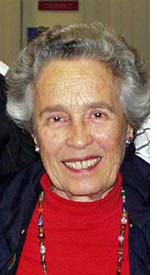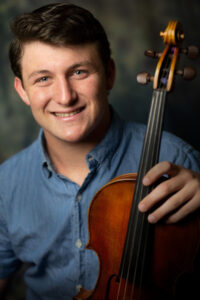By Eileen Wingard

LA JOLLA, California — Outstanding soloists graced the last two concerts by the Tifereth Israel Community Orchestra (TICO). Although unable to attend the April 16 and 18 programs in person, I listened to their recordings and marveled at the brilliant playing by pianist Ines Irawati of Serge Prokofiev’s Piano Concerto No. 3 in C Major. Her finger work was dazzling and her musicality shone in the lyrical melodies. The orchestra, under the capable baton of David Amos, offered strong support. The concerto was rendered at a high professional level.
Also on the program was the world premiere of John M. Luther’s “Three Desert Dances from Exodus,” commissioned by TICO. The printed program included notes about the composition, reflecting the musical intent of the three movements: “The Plagues and Call to Freedom,” “The Breaking of the Tablets,” and “The Promised Land.” Composer John Michael Luther is an innovative composer and talented orchestrator. Particularly memorable was the beautiful English horn solo at the beginning of the second movement and the horn passage reflecting the first sighting of the Promised Land. The syncopated Israeli dance at the end brought the work to an exciting, raucous conclusion. The concert opened with Georges Enesco’s “Roumanian Rhapsody No. 2 in D Major.”

The TICO programs June 25 and 27 featured Gabriel Mayer as viola soloist. I attended both of the performances, taking great pride in Gabriel’s high level of artistry, having been his first viola teacher. His selections were Hebraically inspired: “Yiskor,” by the Hungarian-born Israeli composer, Oedoen Partos and “Suite Hebraique” by the Swiss-born, American composer, Ernest Bloch.
The young violist graduated last May from the University of Denver’s Lamont School of Music where he has been studying with Basil Vendryes.
Gabriel’s performance was noteworthy by its warmth of sound and large dynamic palette. From the soft opening passage of Yiskor, it grew to the impassioned chords of the cadenza before the final soft iteration of the rhythm of the Yiskor prayer’s opening words. Yiskor was accompanied by strings only.
The second work, “Suite Hebraique,” was divided into three movements, Rhapsody, Processional, and Affirmation. The accompaniment was for full orchestra. It was Ernest Bloch’s last Jewish-inspired work. The first movement, Rhapsody, is in Bloch’s characteristically improvisational style. The second movement, Processional, suggests the ancient priests ascending the temple steps, while the final movement, Affirmation, concludes with an emotional statement, as if affirming the Jewish faith.
Gabriel Mayer’s affinity for Jewish music is in no small part due to his playing viola with an ensemble that accompanies the service at Congregation Beth Israel where he heard, from early childhood, the beautiful cantorial voices of Cantor Sheldon Merel, of blessed memory, and Rabbi/Cantor Arlene Bernstein. Gabriel’s father, Andrew Mayer, who plays piano in the ensemble, also has composed several pieces used in the service, as has Gabriel’s older brother, Isaac.
Gabriel’s mother, Heidi Gantwerk and his twin brother, Sebastian, both sing with the group. Heidi Gentwerk is the CEO of the Jewish Federation of San Diego. All, except Isaac, who is in Jerusalem, were present, enjoying the performance.
Other Congregation Beth Israel members in attendance included Jeff and Perla Myers—Jeff plays cello in the ensemble; Emily and Chris Jennuwein—Emily is a past president of Congregation Beth Israel; and the current senior rabbi of the congregation, Rabbi Jason Nevarez and his wife, Nicole. My daughter, Myla Wingard, and son-in-law, Lou Rosen, attended the Sunday matinee performance. Myla plays violin and Lou plays bass guitar and mandolin in the ensemble.
It was another satisfying concert by TICO, which, next year, will be celebrating its 50th anniversary. The season will feature the fifth symphonies of Tchaikovsky, Beethoven, Shostakovitch, and Shubert.